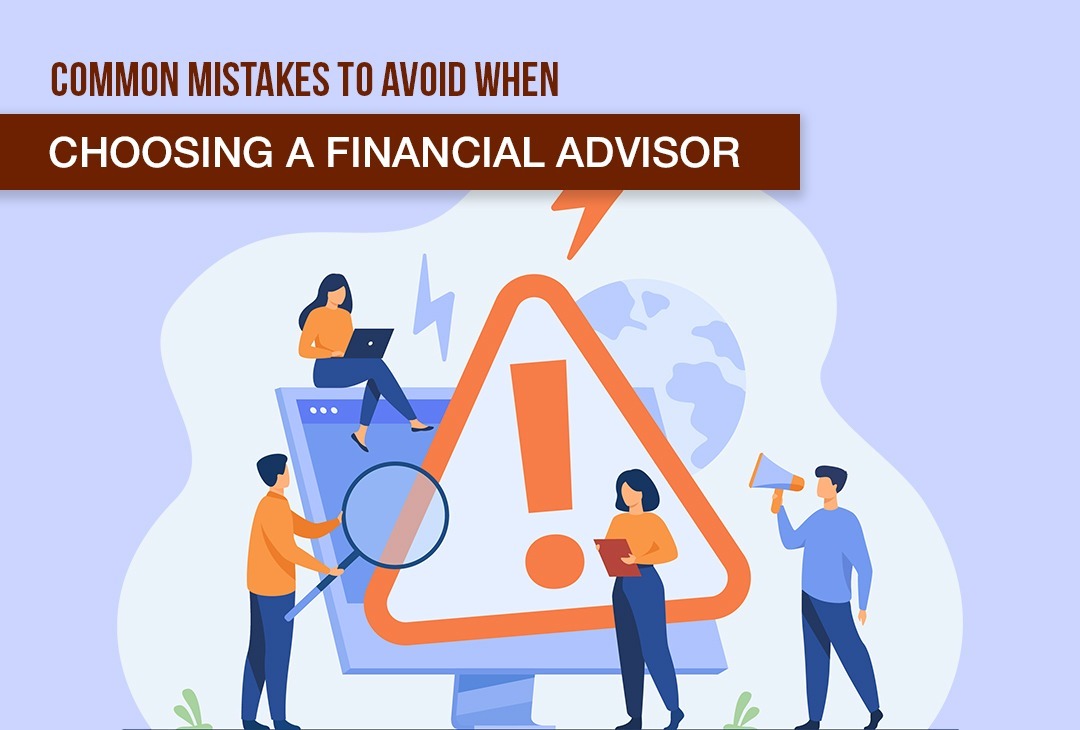Table of Contents
When it comes to health, most people are careful to choose a trusted doctor who is qualified to diagnose and treat them.
But do we apply the same level of thought and caution when choosing a financial advisor to manage our hard-earned money?
In today’s world, financial advice is frequently shared on social media, often by individuals lacking proper expertise or credentials.
The rise of self-proclaimed financial advisors—without certifications or backing from registered financial firms—makes it increasingly difficult to identify trustworthy sources.
That’s why it’s crucial to make the right choice when it comes to selecting a financial advisor to guide you in managing your finances and securing your future with confidence.
Let’s explore the common mistakes to avoid when choosing a financial advisor and understand what to consider when appointing one.
Who Are Financial Advisors, and What Can They Do?

Financial advisors are certified experts who provide advice to individuals and businesses on managing their finances. They have a deep understanding of various financial instruments and design strategies that align with your specific financial goals.
They help analyze your financial situation and objectives to create and execute personalized investment plans. Their services can cover a broad range of areas, including tax advisory, budgeting, savings, estate planning, and insurance planning.
Mistakes to Avoid When Choosing a Financial Advisor
Here are some common mistakes to avoid when selecting and working with a financial advisor.
1. Ignoring Credentials When Choosing a Financial Advisor
Would you let a medical shop assistant perform orthopaedic surgery just because they sell medicine? Similarly, don’t trust your financial future to an unverified advisor, no matter how knowledgeable they seem.
The term “financial advisor” encompasses a wide range of professionals. The foundational qualification that allows someone to officially claim the title of a financial advisor in India is becoming a SEBI-registered investment advisor (RIA).
SEBI-registered investment advisors (RIA) provide paid advice on securities market investments
To become a Registered Investment Advisor (RIA) in India, an individual must complete specific certifications before legally offering investment advice.
The required certifications include:
These certifications, provided by the National Institute of Securities Markets (NISM), are mandatory for anyone wishing to register as an RIA with SEBI.
You can verify the certification of the investment advisor you’re working with by checking the SEBI RIA list– click here.
Additional Certifications Based on the Advisor’s Business Model
Apart from the initial exams, an advisor’s registration also depends on their fee structure and the products they offer. Like;
For Fee-Only Advisors:
- Fee-only advisors must register as Registered Investment Advisors (RIA) with SEBI.
- They are required to hold certifications such as the Chartered Wealth Manager (CWM) designation, accredited by the National Institute of Securities Markets (NISM).
- The CWM certification is offered by AAFM India and is internationally recognized, as it is approved by AAFM US.
Commission-Only Experts:
Commission-only financial experts, who are not RIAs may require CWM certification, along with additional qualifications depending on the products they specialize in. For instance:
- Insurance IRDA Examinations (IRDAI IC 38) for those advising on insurance
Failing to verify these certifications and qualifications can lead to receiving advice from individuals who may not have the necessary expertise, ultimately putting your financial future at risk.
Other important certifications include the Certified Financial Planner (CFP), Chartered Financial Analyst (CFA), and various others
Therefore, always ask for and verify the advisor’s certifications before beginning your partnership.
2. Hiding Investment and Financial Details
Transparency is key when working with a financial advisor. If you don’t disclose your complete financial situation, your advisor cannot provide accurate guidance.
Some clients split their investments among multiple advisors or withhold vital details, expecting stellar results. This fragmented approach can hinder an advisor’s ability to devise effective strategies and might even lead to conflicting recommendations.
For example, when you withhold information about existing investments, it becomes impossible for your advisor to craft a cohesive financial plan tailored to your needs. Trust and full disclosure ensure you get the best advice.
3. Seeking Only Transactional Financial Advice

Many individuals seek financial advisors solely for transactional services, such as stock tips or quick investment ideas.
However, a good advisor does much more—they create comprehensive financial plans that align with your long-term goals, from retirement planning to tax optimization.
Engaging an advisor only for short-term gains may not yield significant benefits. Instead of focusing on short-term gains, choose professionals who guide you in goal-based investing and support you through complex financial decisions
4. Misunderstanding Payment Structures of Financial Advisors
When choosing a financial advisor, it’s essential to understand the differences between fee-based and fee-only advisors.
Though they might sound similar, their fee structures and approaches vary significantly, and selecting the right one depends on your financial needs.
| Fee-Based Advisors | Fee-Only Advisors |
| Charge an annual fee based on a percentage of the Assets Under Management (AUM). For eg. If your assets under management are ₹1 crore and the fee is 1% to 2%, you will be charged ₹1 to ₹2 lakhs per year. | Charge a flat fee, unaffected by portfolio size. |
| They can charge up to 2.5% of AUM. | They can charge up to ₹1.25 lakhs per annum per client. |
| They can sell direct plans. | They don’t offer direct plans but provide investment support. |
Some RIAs charge an hourly fee for their services, but the total annual fee cannot exceed ₹1.25 lakhs.
Choosing between fee-based and fee-only advisors depends on your financial preferences and goals. Understanding their cost structures will help you make the right choice for your investment needs.
5. Choosing Advisors With Incompatible Strategies
Your financial advisor’s approach should align with your goals and risk tolerance. For example, if you prefer conservative investments like fixed deposits or government bonds, working with an advisor specializing in high-risk equity strategies may not be suitable.
Discuss your financial objectives and preferred investment avenues before committing to an advisor. Compatibility in strategy ensures a smoother partnership.
6. Relying on Media or Friends for Financial Decisions Instead of Professional Advisors
Taking investment advice from media headlines, influencers, or friends can lead to decisions that don’t align with your personal financial goals or risk tolerance. While well-meaning friends or colleagues with a finance background may offer insights, managing investments requires specialized skills and experience.
Similarly, blindly following trends, such as investing in any particular stock or popular mutual funds based on social media hype, may not be suitable for you.
It’s crucial to trust your investment advisor or a reputable financial firm that can provide tailored recommendations based on your unique situation, rather than following unverified advice.
The most contrarian thing of all is not to oppose the crowd but to think for yourself.
-Peter Thiel
7. Delaying the Decision to Hire an Advisor

Many Indians wait until they accumulate significant wealth to hire a financial advisor, believing it’s unnecessary early on. However, starting early allows you to build better financial habits, optimize tax planning, and set the foundation for long-term wealth creation.
Whether you’re planning for your child’s education, a home purchase, or retirement, a financial advisor can provide clarity and structure, ensuring you stay on track to achieve your goals.
In 2023, the Financial Planning Standards Board Ltd. (FPSB) conducted a consumer research study, surveying 1,011 Indians selected based on specific parameters.
Their findings highlight that investors who receive guidance from a financial planner experience an enhanced quality of life, increased financial confidence, and significantly reduced financial stress compared to those who do not engage with one.
Start Your Journey With a Mutual Fund Distributor
Understanding the role of a financial advisor and avoiding common mistakes when selecting one is crucial for making informed investment decisions.
However, if you’re just starting your investment journey and aren’t ready to work with a full-fledged financial advisor yet, mutual funds offer a great starting point.
While it might not provide the personalized guidance of a financial advisor, it allows you to begin investing with minimal complexity. By learning about different mutual fund types, their focus areas, and allocations, you can create a strategy that aligns with your goals.
In India – Individual investors’ mutual fund assets surged by 48.67%, rising from ₹27.15 lakh crore in August 2023 to ₹40.36 lakh crore in August 2024! (Source: Mint)
So, if you’re just starting out or perhaps feel you don’t need a financial advisor and prefer to focus solely on mutual funds—one of India’s most popular investment choices today—you might still benefit from expert guidance
Having someone to guide and execute your mutual fund investments could still make the journey smoother and more efficient, and help you build a personalized investment strategy using mutual funds.
This is where an AMFI-certified mutual fund distributor (MFD) comes in. Regulated by SEBI and AMFI, these professionals are equipped to suggest mutual funds based on your needs and execute investments once you approve.
(To become a mutual fund distributor, one must pass the NISM Series V-A: Mutual Fund Distributors Certification and obtain AMFI registration.)
While they don’t provide comprehensive financial advice, they can educate you about mutual fund options and help you align your choices with your financial goals.
Best of all, you don’t have to pay them directly—they earn commissions from the mutual fund companies.
Quote: Most people don’t plan to fail they fail to plan
–John L Beckley
Where to Find an MFD?

If you’ve decided to start your investment journey with a mutual fund distributor (MFD), the next step is knowing where to find one to begin investing confidently.
Some platforms, like Moolaah, provide seamless connections to AMFI-registered mutual fund distributors, making it easier to access expert financial guidance.
Moolaah is the retail platform of PRP Professional Edge, a SEBI-registered Merchant Banker and Investment Advisory firm. It was designed specifically to empower retail investors—addressing the need for everyone to have access to expert financial guidance to grow their money.
While PRP focuses on investment advisory services, Moolaah bridges the gap by helping retail investors connect with SEBI-certified mutual fund distributors.
Moolaah simplifies the process of finding the right MFD by allowing investors to review the expertise and experience of the extensive list of MFDs registered with Moolaah (known as Moolaah Partners) and select the one that best fits their needs.
Most importantly, Moolaah eliminates any trust concerns by carefully verifying the certifications of each MFD before onboarding them as Moolaah Partners, so you can invest with complete confidence.
Beyond mutual funds, Moolaah acts as a comprehensive investment platform, enabling investors to explore and invest in other products like stocks, bonds, and fixed deposits—all in one place.
A Confident Investment Starts with the Right Guidance

Choosing the right financial advisor is crucial for securing your financial future, especially in a time when more people are making investment decisions based on videos from social media influencers or selecting financial advisors without proper verification.
This trend can lead to costly mistakes. Just like trusting an unqualified healthcare worker with your health can lead to serious consequences, poor financial guidance can cause you to lose your hard-earned money.
Your financial future deserves the right expertise. Whether it’s a comprehensive financial advisor or a trusted mutual fund distributor, the right professional can make all the difference.
If you need comprehensive advisory services, it’s important to seek experienced and certified financial advisors, such as those from firms like PRP Professional Edge.
On the other hand, if you’re looking for guidance with mutual fund investments, platforms like Moolaah can help you connect with certified mutual fund distributors, giving you the confidence and peace of mind to start investing with a trusted partner.




